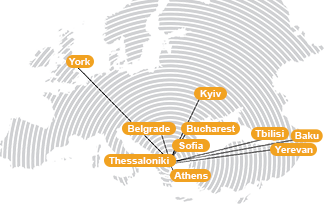The overall concept of RRIstart consists of the development of a conceptualization and focus-setting approach within the relation between startups-investment-society by adapting an RRI model that will help STEM startups to develop their innovations within the RRI principles. Secondly, RRIstart will develop a detailed indicator list (based on GIIN, IRIS, ESG, RRI) for impact investment that would work in full integration with the proposed RRI startup model and will be aimed at helping public and private investors to ensure that all the investment that they facilitate will lead to impactful and systemic changes within the affected societies and consumer groups. As well, RRIstart builds upon the need to identify new constellation of actors (beyond the quadruple helix) that would properly represent the RRI context of startups and impact investment. Lastly, RRIstart will pilot these innovations within 3 cross-sectoral and multidisciplinary contexts (environment, advanced materials and biotechnology/agri-food) in order to ensure the market adaptation of the proposed solutions and also to better explore the requirements of brining society closer to science through RRI-enabled entrepreneurship. The pilots will have a translational nature aiming to move the ideas from “lab to market”. Based on the pilot outcomes, RRIstart will consolidate the contextualized RRI startup model and RRI-based impact investment in publications and outputs that would facilitate an immediate market transfer and uptake of these innovations.
Objective 1 – Contextualize and test an RRI model tailored for STEM startups
RRIStart introduces a contextualized RRI model tailored for the needs of STEM startups. More specifically, this model will encompass the resource-constrained environment of startups and will help them integrate RRI in their innovation development & marketization process, increasing thus their chances of impact investment and market apprehension of the innovation/products that they develop. Therefore, RRIstart will bring RRI closer society and enterprises while also providing a novel approach towards interdisciplinarity in startups, business model innovation and impact investment.
Objective 2 – Research & adapt an RRI-based indicator set for impact investment
RRIstart extends and adapts a novel set of indicators (RRI-powered) based on GIIN, IRIS, ESG and MoRRI indicators to assist investors (both public and private) in their decision-making process towards the responsible investment in startups and/or innovation development. By adopting an RRI-based indicator list, the investors will be able to ensure that societal needs are better represented and linked with science development, while also enforcing (through institutional/stakeholder coercive/normative/mimetic pressures) startups & innovation developers to adopt an RRI-approach to R&D. This will lead to a deeper interaction between science, innovation and the economy while also paving the way to open science and social impact (through RRI compliance).
Objective 3 – Research & design a novel constellation of actors to enable RRI-based startups and impact investment
RRIstart pushes the quadruple helix approach to new frontiers in order to understand what multistakeholder constellations are required to properly enable RRI-based startups and RRI-based impact investment. This endeavour identifies new forms of multi-stakeholder collaboration, the emergence of new stakeholders and the implicitly adaptation of the RRI science of the SwafS knowledge-base to be suitable for startups and impact investment, enabling thus the achievement of the SwafS goals. The role, collaboration incentives & envisioned interactions to better enable impact investment & responsible startups will also be researched.
Objective 4 – Pilot the contextualized RRI model for startups, the adapted RRI-based impact
investment indicators and the newly identified constellation of actors
RRIstart tests the contextualized RRI model tailored for the needs of STEM startups in order to update the SwafS knowledgebase with evidence-based & applied models while also exploring the feasibility of the model in impact investment & RRI-based startups. Three (3) such pilots will be implemented covering sectors such as environment, advanced materials and biotechnology (agrifood) by leveraging alternate forms of investment (public & private). This will be done by also quantifying, validating & confirming the developed indicators & metrics and align/integrate them with the MoRRI indicators. Similarly, during the pilots, RRIstart will explore the relevance of the proposed multi-stakeholder approach to enabling the transition of RRI-enabled impact investment in startups in an applied manner (and potentially identify new stakeholders and hybrid actors required to support RRI-based startups and RRI-based impact investment, while also leveraging the science-society relations). This will make EU startups & investors more RRI aware & capable.





